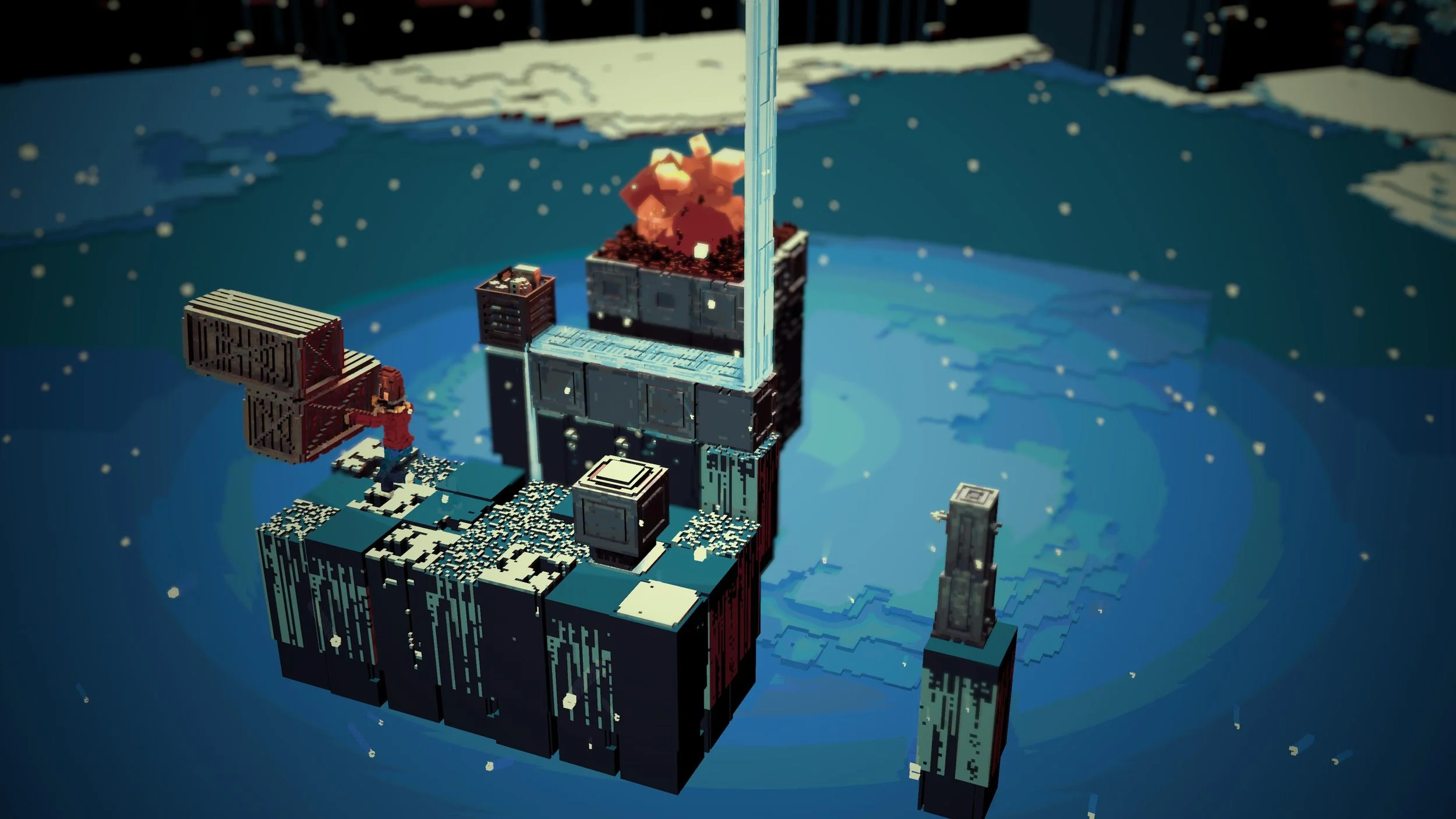Bonfire Peaks
Greg he writes letters and burns his CDs
They say you were something in those formative years
Hold on to nothing as fast as you can
Well, still, pretty good year
— Tori Amos, “Pretty Good Year”
Tof Eklund, Contributing Editor
The protagonist of Bonfire Peaks has an iconic swept hairdo and mustache (or maybe that's supposed to be his mouth, it's hard to tell with voxel faces), but no name, so I'm going to call him Greg. Despite having no narration and no dialogue, Greg is the ultimate emo hipster loser. I know this is true because, when Greg decides to burn all his worldly possessions, he paddles a swan boat out to a not-so-remote part of a local park to do so. A swan boat, people. It's so pathetic I could cry.
I imagine, if I could see Greg's sad little mustache clearly, it would be a meticulously-groomed handlebar, but maybe it's an underwhelming attempt at a Tom Selleck: there's a '70s vibe to some of the imagery in Bonfire Peaks. It scarcely matters: Greg has always been with us. Tori Amos described her Greg as someone who "is 23, lives in the north of England, and his life is over, in his mind." You know Greg: he's always young(-ish), always just-past being with it, and always convinced that his life is over .
In Bonfire Peaks, you help Greg immolate his memories: each level features a wooden crate full of Greg's stuff and a bonfire you need to drop or push it into. CDs, LPs, or mixtapes, it doesn't matter: one of the voxel-y shapes in the crate looks like a box of breakfast cereal. Maybe that one held the secret decoder ring that sounded so cool but was so crap? Each bizarre burning ground in the game initially appears as a more-plausible campfire ring, scattered about the park site. The stone (concrete?) monoliths Greg must ascend are clearly symbolic: like the nightmare climbing sequences in Catherine, they're built out of dread.
The puzzles in Bonefire Peaks are like voxel Sokoban, but also a little like Catherine's climbing puzzles, just without the time pressure. Catherine's protagonist is running out of time, but Greg's time is already over "in his mind," so the pacing is appropriately elegiac. Moving up while bringing along your box of combustible feelings is the goal, and that box is literally half your size, so you have to shift between leaving it behind (hoping to retrieve it later), maneuvering its bulk through narrow spaces, and using it as a tool (to stand on or push another block with). The precise details of which way you're facing and how you're holding your burnables (or another block, or a stack of blocks) are crucial. At first the puzzles are low-key, but they slowly progress into challenges where the solution is obvious, except that the obvious solution is impossible for some reason.
Obvious but impossible answers suit Greg's melancholy mood, and I'll give developer Corey Martin credit for coming up with challenges that reward spatial thinking more than "trying everything." New elements, like crumbling blocks, ramp up the difficulty to a solid challenge for any fan of the genre, without ever becoming as brain-breaking as Baba is You. I wish you could rotate the camera all the way around the puzzles, but the limited range of motion keeps the focus on Greg and his limited perspective. It all works as a metaphor for the way Greg is stuck in the past. The perspective that will allow him to get on with things will be obvious in hindsight, when he finally figures it out. Then again, maybe not.
Minor spoiler warning: burning your most treasured possessions, or constantly fantasizing about doing so, is not a substitute for therapy. The further you play in Bonfire Peaks, the more surreal the camp gets, as poorly-parked station wagons and folding chairs give way to things presumably plucked from Greg's disordered memories, like a complete living room set perched atop a hillside. The idea that Greg needs to, and can, "just snap out of it" gives way to the impression that his problems are more serious than navel-gazing post-teen angst.
Bonfire Peaks doesn't trivialise depression, trauma, or whatever Greg's delusional state is. In part, that's because the game says nothing directly about what's going on with Greg, leaving us to infer everything, but what we can infer is tragic as well as comic, pathetic in the sense of inspiring empathy as well as derision. For some players, the context of the game will be nothing more than window dressing, a visual context for the puzzles. To me, it's almost the opposite. I won't remember the details of Bonfire Peaks' challenges, but I'm struck by this swan-boating emo loser with his mustache and his bomber jacket, and I'll keep wondering what happened to Greg, and Greg isn't even his real name.





